Students spend hours in class, doing homework assignments, analyzing samples or crunching data sets—work that can seem removed from the people they hope to help. Service learning helps fill that gap.
Education, deep cross-cultural exposure, hands-on experience, and service to others, are deeply intertwined, says Deborah Rose, SM ’75, a chronic-disease epidemiologist. In 2017, she made a $5 million gift to expand the Rose Traveling Fellowship Program—which has funded more than 50 epidemiology and biostatistics students—into the new Rose Service Learning Program, open to students and postdoctoral scholars from all departments of the Harvard Chan School. She says that combining an international experience with service learning “encourages a review of one’s most basic assumptions and deepens understanding.” Dean Michelle A. Williams ensured that service learning positions in the U.S. also were available.
Eighteen students received support this year for research projects and internships abroad or in the United States. Misbath Daouda, MPH ’18, studied the health effects of air pollution on children in Ulaanbaatar, Mongolia (photo at left). “It is one thing to read about [air pollution] in articles,” she says, “and another to experience how difficult it is to simply breathe in these conditions.”
In Boston, Tariana V. Little, DrPH ’20, helped launch a weekend food program for homeless public school students. She hosted several farmers market–style events for families, where she learned about their preferences and needs.
Rose says she hopes that reflecting upon and writing about their service-learning projects will deepen the students’ own understanding and guide them in how to communicate the lessons learned to others.

